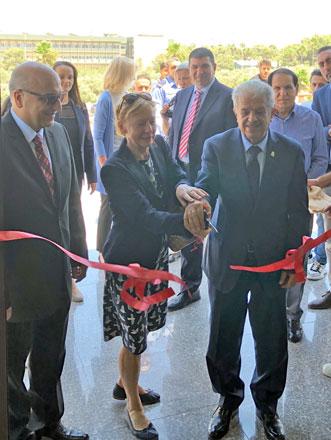You are here
Academic publication explores interdisciplinary approaches to cultural heritage preservation
By Saeb Rawashdeh - Mar 22,2023 - Last updated at Mar 21,2023
AMMAN — The perception of cultural heritage changes, develops and evolves over time due to economic, social, cultural, political and technological development, noted a Jordanian expert.
“Cultural Heritage: An intersection of Humanities and Sciences” is a publication of 56 scholarly papers presented at the Alexander von Humboldt conference on cultural heritage held between April 16 and April 19 in Amman, said Professor Hani Hayajneh.
Participants from Algeria, Austria, Belgium, Denmark, Egypt, the UK, France, Germany, Greece, Italy, Japan, Jordan, Lebanon, Mexico, Morocco, the Netherlands, Palestine, Spain, Switzerland, Syria, Tunisia, Turkey and the US attended the conference, he said.
“Given the integrative nature of the human intellectual yield, which is manifested in tangible and intangible forms, these articles demonstrated the diversity of topics as well as the state-of-art of interdisciplinary approaches that participants used in their research on cultural heritage,” Hayajneh said.
“They attempt to shed light on our understanding of the human cultural inheritance and the human world through a multidisciplinary approach, which encompasses the wide range of field and subfields, including history, biology, geology, physics, fine arts, human behaviour, sociology, philosophy, psychology, warfare and peace, philology, education, computer science, economy, law, etc,” the professor elaborated.
Due to digitisation and communication technology, museums and other manifestations of cultural heritage become accessible from different continents, while social media is enabling a re-contextualisation of younger generations’ background and experience with its heritage and its values, Hayajneh said.
The problem that must be addressed is the destruction and looting of cultural heritage.
Military conflict, forced migrations and lootings pose a threat to cultural heritage, Hayajneh emphasised, noting that displacement and forced migrations have resulted in a loss of social and spatial context, noting that heritage is deeply rooted in places and history.
“Organisations should take a leading and continual role in cultural preservation and more discussion with various communities is necessary for more effective preservation tactics,” Hyajneh said.
Related Articles
IRBID — “Cultural heritage is an expression of a society’s vision of itself, of its history and identity,” German Ambassador to Jordan Birgi
AMMAN — Jordan’s national dish mansaf was inscribed on the Representative List of the Intangible Cultural Heritage of Humanity during a UNES
AMMAN — International agreements to protect and promote intangible cultural heritage (ICH) have only recently become an incentive for Jordan



















